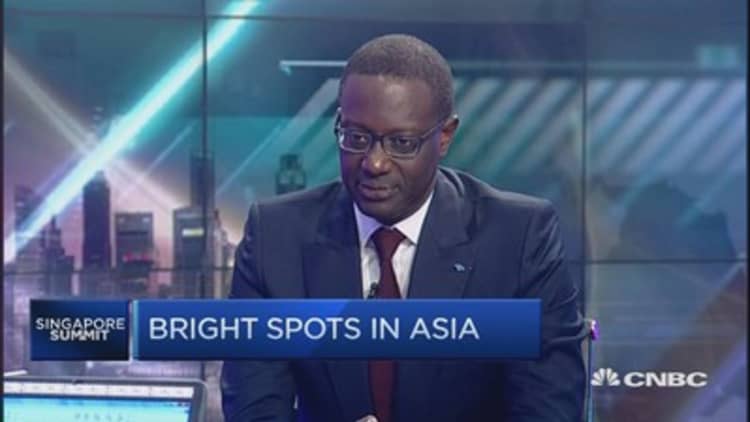Tidjane Thiam, Credit Suisse's new chief executive, is preparing to launch a substantial capital raising when he unveils his strategic plan for the bank in two weeks' time, according to people briefed on the plan.
While not specifying an amount, they pointed to a poll published last week by analysts at Goldman Sachs concluding that 91 per cent of investors expect the Swiss bank to raise more than SFr5 billion in new equity.
The move follows a warning by Deutsche Bank that it was set to scrap its dividend for the first time since the second world war after it incurred a €6.2 billion net loss in the third quarter because of big charges taken to back restructuring being undertaken by new chief executive John Cryan.
The major restructuring under way at the Swiss and German lenders is a stark reminder that Europe's big investment banks are still struggling to adapt to the post-crisis world and are being left behind by US rivals. Having been slower to reform and harder hit by European regulation, they have lost market share in many areas.

Credit Suisse's fresh capital is likely to be used to absorb losses triggered by a faster restructuring of the Swiss group, the people briefed on Mr Thiam's plan said. But the bank will also need higher capital ratios to comply with toughening demands from regulators.
The Swiss authorities are expected to announce an increase of minimum capital ratios over the coming months, which could prove more challenging for the bank than its better capitalised local rival, UBS. Credit Suisse's common equity tier one capital ratio of 10.3 per cent compares with UBS's 13.5 per cent.
Deutsche Bank's ratio will be about 11 per cent at the end of the quarter, above what it is required to hold but below most of its international rivals.
Mr Thiam, who took over in the summer, recently brought forward the announcement of his new strategy to October 21 from the end of the year.
His strategy is expected to shift the bank's focus away from volatile investment banking operations and towards private banking and Asian markets.
The former head of Prudential, the UK insurer, is also keen to establish a substantial in-house asset management operation. Investors say he has hinted at consolidating that shift with an acquisition, though he has signalled he has cooled on the idea of a deal in the short term.
More from the Financial Times:
Deutsche Bank shares hit after flagging €6.2bnthird-quarter loss
Low inflation worries dog Fed as it debates rate rise
US Congress in chaos after McCarthy quits Speaker race
Mr Thiam is known to be wary about the large amounts of capital required by many areas of investment banking. Bankers said that could lead to a significant reduction of some of the group's fixed-income businesses, traditionally a core operation.
But colleagues believe Mr Thiam is enthusiastic about the bank's activities in equities, in which it has traditionally been underweight. He sees the business of managing stock market listings and raising equity for clients as a powerful engine for expanding into emerging markets.
Deutsche blamed €5.8 billion of its third-quarter loss on a goodwill write-off at its investment bank and a shortfall between how retail subsidiary Postbank is valued and how much it expects to gain from selling it. Deutsche is also setting aside another €1.2 billion to deal with the continuing slew of litigation that has dogged the bank in recent years.
Having set Asian growth as a priority at Prudential, Mr Thiam is expected to set himself a similar objective at Credit Suisse, putting a particular emphasis on China.
His plans are also set to involve deeper cost-cutting through increased investment in technology, an area where analysts say the Swiss bank has lagged behind competitors.
Some of Credit Suisse's less profitable activities look set to be axed, including its US broker-dealer unit, though the bank is expected to show a strong commitment to its broader presence in the US.
Read MoreEurope ekes out gains at close as oil prices rally 2.2%
The October 21 plan is expected to involve decentralising some operations and streamlining Credit Suisse's management structure. The group's previous practice of having divisions run by two or even three co-heads is likely to be dropped, people familiar with the process said. One person said that the bank would move to a structure of regional heads across business lines.
In Switzerland, there are fears that the restructuring could lead to sweeping job cuts in its home market. But people familiar with Mr Thiam's thinking said that he will seek to allay such concerns by signalling a commitment to expanding the bank's position in Switzerland.
However, the new chief executive has scotched rumours that he would like to buy local rival Julius Baer, making it clear internally that such a combination would make no sense.

